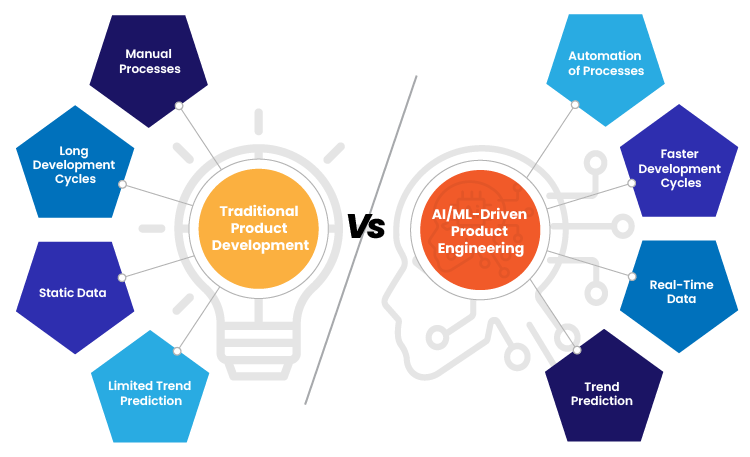

ACL Digital
7 Minutes read
AI and ML as Game-Changers in the Modern Product Development Process
Artificial Intelligence (AI) and Machine Learning (ML) have rapidly evolved into cornerstone technologies across numerous industries, redefining how modern products are conceptualized, developed, and optimized. AI enables systems to perform human-like tasks such as problem-solving and decision-making, while ML allows systems to learn from experience and improve. These technologies enable businesses to develop smarter, more efficient products that adapt to real-time user needs and market dynamics.
In the field of product engineering, AI and ML are game-changers. They automate complex tasks, deliver insights through data analytics, and enable companies to innovate faster. For example, AI can analyze massive amounts of market data to help businesses predict future trends, enabling more informed decisions during the design phase. The ML algorithms further enhance this by identifying patterns in product usage, leading to iterative improvements based on user behavior. By leveraging AI/ML, businesses can accelerate production processes, improve product quality, and deliver more personalized solutions to rapidly gain a competitive edge in various markets. Let’s explore this blog and see how AI/ML technologies are revolutionizing how companies approach the entire product development lifecycle.
A Comparative Analysis: Traditional Product Development vs. AI/ML-Driven Engineering
When comparing traditional product development with AI/ML-driven product engineering, the differences are significant:

| Traditional Product Development | AI/ML-Driven Product Engineering |
| Relies heavily on manual processes for design, testing, and iteration | Automates many tasks, such as design optimization, testing, and performance monitoring |
| Longer development cycles due to sequential stages and human involvement | Uses AI to analyze market data and predict trends, enabling more dynamic and scalable product designs |
| Decision-making is often based on static data and past experiences | ML models continuously improve products based on real-time user data and feedback |
| Limited ability to predict future trends or user behavior accurately | Shortens development cycles by streamlining processes, automating tasks, and reducing time spent on manual iteration |
How AI/ML Gives a Competitive Edge to Various Industries in Developing Their Products
Artificial Intelligence (AI) and Machine Learning (ML) are pivotal in giving industries a competitive edge by transforming product development processes. Here’s how AI/ML is driving innovation and efficiency in a variety of areas, supported by specific use cases:
- Consumer Electronics: AI is revolutionizing the consumer electronics market with smarter, more personalized devices. Apple’s Siri and Google Assistant leverage AI to understand and respond to user commands, providing a personalized experience based on voice recognition and contextual understanding. These virtual assistants improve over time by learning from user interactions, making devices more intuitive and user-friendly.
- Automotive Industry: In the automotive sector, AI and ML drive advances in autonomous vehicles and intelligent manufacturing. For example, Tesla uses AI-powered algorithms for its Autopilot system, which processes data from sensors and cameras in real time to allow vehicles to navigate, park and change lanes automatically. ML models continuously improve system performance based on driving data, enhancing safety and functionality with each iteration.
- Healthcare: AI and ML are transforming healthcare through advanced diagnostic tools and personalized treatment plans. IBM Watson Health applies ML algorithms to analyze vast amounts of medical data, including patient records and research journals, to help physicians/ doctors diagnose diseases and recommend treatment options. This helps deliver more accurate, personalized care and accelerates the development of new treatments.
- Retail: AI and ML enhance customer experiences and optimize retail inventory management. Amazon uses AI-driven recommendation systems to analyze browsing and purchase history, suggesting personalized products. Additionally, ML algorithms predict demand trends, helping retailers manage stock levels efficiently and reduce waste.
- Manufacturing: AI and ML optimize production processes and predictive maintenance. General Electric (GE) utilizes AI to monitor equipment conditions and predict breakdowns before they occur. This proactive maintenance approach reduces downtime and extends machine life, providing a competitive advantage through reduced operating costs and increased reliability.
How Do AI and ML Enable Businesses to Deliver Personalized and Demand-Driven Products?
AI and Machine Learning (ML) are revolutionizing how products are customized and personalized to meet consumer preferences and market demands. Here’s how these technologies are shaping the future of product customization:
- AI’s Role in Consumer Behaviour Analysis: AI systems analyze vast amounts of consumer data to identify patterns and preferences. Using natural language processing and sentiment analysis techniques, AI is able to interpret complex consumer behaviors and preferences, allowing businesses to tailor product features more accurately. This delivers highly personalized products that resonate with individual users, enhancing customer satisfaction and engagement.
- Leveraging ML for Real-Time Demand Forecasting and Customization: ML algorithms predict demand trends by analyzing historical data and market signals. This insight allows companies to dynamically customize their product offerings, ensuring that inventory and features are aligned with customer needs. Real-time manufacturing optimization driven by ML helps companies stay ahead of trends and respond to changes in demand faster, optimize resource fit, and reduce excess inventory.
Benefits of AI/ML in Product Development
AI and Machine Learning (ML) are revolutionizing product development by offering significant advantages in several key areas:
- Accelerated Development Cycles: AI automates repetitive tasks and streamlines iterative design processes, drastically reducing development time. AI-powered tools facilitate rapid prototyping and testing, enabling faster iterations and quicker adjustments based on real-time data, speeding up the overall product development life cycle.
- Enhanced Product Design: ML algorithms leverage vast data to provide actionable insights for better design decisions. By processing and analyzing user actions, these algorithms help optimize product features and tailor them to meet user needs more effectively, resulting in more innovative and user-centric products.
- Improved Quality Assurance: AI-powered systems enhance quality assurance through automatic fault detection and continuous performance monitoring. These technologies detect issues early in production, ensuring higher product quality. Additionally, AI helps develop predictive maintenance and reliability engineering by anticipating potential failures, thereby reducing downtime and extending product life.
About ACL Digital
ACL Digital is a leading global product engineering and digital transformation service provider, delivering cutting-edge technologies that help businesses stay competitive in today’s fast-paced market. With decades of experience in product development, ACL Digital has established a proven track record of creating innovative, high-quality products across industries. Our expertise in Artificial Intelligence (AI) and Machine Learning (ML) drives transformative solutions, enabling businesses to unlock new possibilities through intelligent automation, data-driven insights, and personalized experiences.
Leveraging AI/ML technology, ACL Digital accelerates the product development lifecycle, optimizes processes, and enhances product performance. We help companies design, develop, and implement smart, connected products that address real-time market demands and elevate user experiences. From concept to deployment, our deep technical expertise and commitment to excellence empower businesses to thrive in the age of intelligent technologies.





